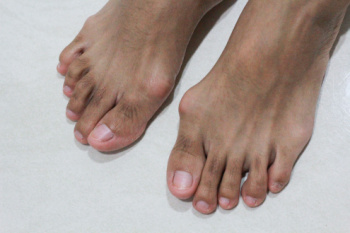
A bunion is a bony bump that forms on the joint at the base of the big toe, often causing the toe to deviate towards the others. Common issues can include chronic pain, bursitis or inflammation of the fluid-filled pads that cushion the bones, and metatarsalgia or pain and inflammation in the ball of the foot. Severe cases or complications can lead to hammertoes or crossover toes, where toes bend abnormally, and even arthritis in the big toe joint. Preventing bunion complications involves wearing properly fitted shoes with a wide toe box, avoiding high heels, and using orthotic inserts to reduce pressure on the bunion. Maintaining a healthy weight can also alleviate stress on the feet. Treatment options range from non-surgical methods like padding and medications to manage pain to surgical procedures for more severe cases. If you have a bunion that is causing worsening symptoms, it is suggested that you promptly consult a podiatrist who can help to manage symptoms and prevent further complications.
If you are suffering from bunions, contact the foot specialists of Table Mountain Foot and Ankle. Our doctors can provide the care you need to keep you pain-free and on your feet.
What Is a Bunion?
A bunion is formed of swollen tissue or an enlargement of boney growth, usually located at the base joint of the toe that connects to the foot. The swelling occurs due to the bones in the big toe shifting inward, which impacts the other toes of the foot. This causes the area around the base of the big toe to become inflamed and painful.
Why Do Bunions Form?
Genetics – Susceptibility to bunions are often hereditary
Stress on the feet – Poorly fitted and uncomfortable footwear that places stress on feet, such as heels, can worsen existing bunions
How Are Bunions Diagnosed?
Doctors often perform two tests – blood tests and x-rays – when trying to diagnose bunions, especially in the early stages of development. Blood tests help determine if the foot pain is being caused by something else, such as arthritis, while x-rays provide a clear picture of your bone structure to your doctor.
How Are Bunions Treated?
- Refrain from wearing heels or similar shoes that cause discomfort
- Select wider shoes that can provide more comfort and reduce pain
- Anti-inflammatory and pain management drugs
- Orthotics or foot inserts
- Surgery
If you have any questions, please feel free to contact our office located in Wheat Ridge, CO . We offer the newest diagnostic and treatment technologies for all your foot care needs.
